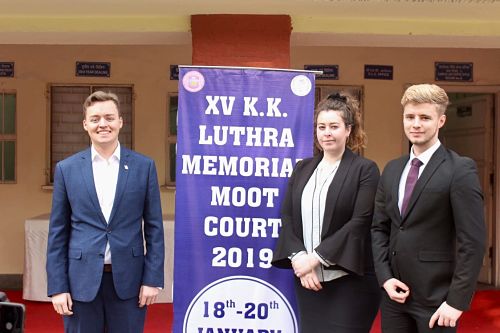A team from University of Bristol’s Law School posted an impressive performance at India’s sole international criminal law mooting contest, reaching the semi-final of the KK Luthra Memorial Mooting Competition, held in Delhi on 18-20 January.
Researcher Charles Archer, in the second year of his law degree and mooters Zachary Bourne and Alice Grimley Evans, in their third years, formed one of 50 teams whose strong memorials qualified them for the oral rounds of the high-profile event.
The standard of mooting was high, given the contest’s huge prestige for students in India, said Ms Grimley Evans.
“We were honoured and delighted to reach the semi-final, where it was some consolation to be knocked out by the team that went on to win,” she said.
“We’re very proud that Bristol University was the most successful overseas team in the event, now in its 15th year, which is a key fixture in the legal calendar in India. Eight of the 28 sitting judges on the country’s Supreme Court come from the University of Delhi’s law school. It’s not unusual, we discovered, for teams to spend six months preparing.”
As well as teams from India, the Bristol University team competed with squads from Northumbria University (UK), University of Colombo (Sri Lanka), University of Lusaka (Zambia), University of Gondar (Ethiopia), and Tribhuvan University (Nepal).
The event revealed considerable differences between English and Indian courts, said Mr Bourne.
“In almost every aspect, we were confronted with unfamiliar procedures, such as the prayer to the Court added at the end of submissions,” he said.
“The judges also expressed their views with surprising vehemence and the style of advocacy was far, far faster than you would find in an English moot. Equally striking, though, was the incredible hospitality we encountered. Everyone at the Campus Law Centre was welcoming, making for a truly wonderful time in Delhi.”
The mooting question on the cross-border implications of money laundering and the powers of investigating agencies also provided insights into legal differences between jurisdictions, said Mr Archer.
“Preparing materials for the moot was highly challenging as international criminal law is outside the law curriculum at Bristol University. We are deeply grateful for the kind support of professors who helped us,” he said.
“We were also required to produce memorials, not just skeletons. I warn anyone who’s planning to compete next year, that you’ll be up against teams that cite 80 cases and produce 25-page memorials, in stark contrast to the usual 1-page skeleton arguments used in British mooting. We all came away impressed by the dedication of our opponents.”
Charles Archer, Zachary Bourne, and Alice Grimley Evans also took part in an advocacy workshop by professor Susan Karamanian, the Dean of Hamad Bin Khalifa University.
After three days of mooting, the law students visited Jaipur and Agra, concluding a trip that Ms Grimley Evans described as highly enjoyable.
“I would strongly recommend any ambitious mooters at Bristol to consider this event next year,” she said.
“This is the second straight year that Bristol University has performed well at this moot. And whatever your performance, you can expect to come home with warm memories of amazing hospitality and an intellectually challenging moot.”

